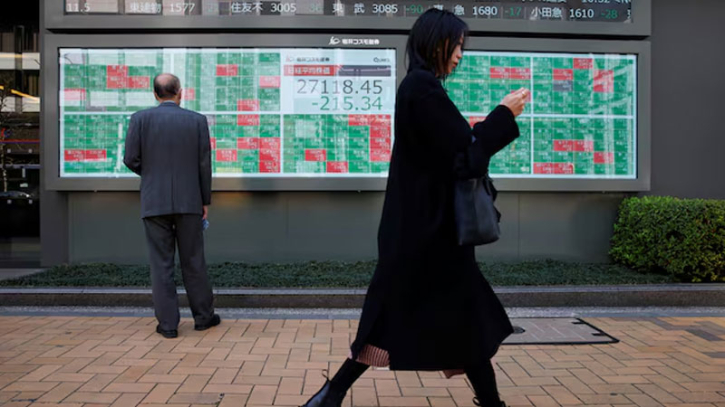Asian stocks wobble as investors wary before US inflation data

Asian shares stuttered in choppy trade on Wednesday as markets braced for a key U.S. inflation reading, while Japan's yen lurked just shy of 160 per dollar level, keeping traders on alert for another round of intervention by Japanese authorities.
Risk sentiment was also capped as hawkish comments from Federal Reserve officials kept near-term U.S. rate cut expectations in check in a boost to the dollar. A jump in Australian consumer inflation to a six-month high in May lifted the Australian dollar to its highest in two weeks.
MSCI's broadest index of Asia-Pacific shares outside Japan struggled for direction and was flat at 566.53, not far from the two-year high of 573.38 it hit last week.
Japan's Nikkei and Taiwan stocks led by chipmakers, tracking the rally in tech heavy Nasdaq on Tuesday, with Nvidia surging over 6%, snapping out of a three-session tailspin that had erased about $430 billion from its market value.
European stocks also looked poised for a strong start, with Eurostoxx 50 futures up 0.4% and German DAX futures 0.3% higher. FTSE futures were 0.2% higher.
On the U.S. monetary policy front, Fed officials urged patience on interest rate cuts, with governor Lisa Cook saying the central bank is on track for a rate cut if the economy’s performance meets her expectations. But Cook declined to say when the Fed will be able to act.
U.S. Federal Reserve Governor Michelle Bowman reiterated her view that holding the policy rate steady "for some time" will probably be enough to bring inflation under control.
The comments along with data showing a stable housing market kept expectations in check over when and by how much the Fed will cut rates.
"(The) worst thing the Fed could do is ease and then the data continues to firm the inflation numbers back around," said Rob Carnell, ING's regional head of research for Asia-Pacific.
Markets are pricing in 47 basis points of easing this year, with a rate cut in September pegged at 66% probability, CME FedWatch tool showed.
Traders are eagerly awaiting Friday's release of the U.S. personal consumption expenditures (PCE) price index - the Fed's preferred measure of inflation, with economists polled by Reuters expecting the annual growth to ease to 2.6% in May.
In the currency market, the Aussie rose more than 0.5% to $0.6685 after hotter-than-expected inflation data, leading markets to narrow the odds on another rate hike as early as in August.
The dollar index , which measures the U.S. unit against six peers, was steady at 105.66, while the euro was at $1.071075.
The yen was fetching 159.76 per dollar and has been trading in tight ranges as it stalks the crucial 160 level that some traders say might bring about another round of intervention.
The yen touched a 34-year low of 160.245 per dollar on April 29, prompting Tokyo to spend roughly 9.8 trillion yen in late April and early May to support the currency.
The latest slide in the yen has come in the wake of the Bank of Japan's (BOJ) decision this month to hold off on reducing bond-buying stimulus until its July meeting.
"What they said last time (June policy meeting) was just so insubstantial, that the market couldn't help but be disappointed by it and ... as a result of that we are knocking on 160," said ING's Carnell.
The BOJ though is dropping signals that its quantitative tightening plan in July could be bigger than markets think, and may even be accompanied by an interest rate hike.
"We need to see the BOJ coming through with an actual hike. We still think that July looks a good month," Carnell said.
In commodities, oil prices rose, with Brent futures 0.45% higher at $85.39 a barrel, while U.S. West Texas Intermediate (WTI) futures were up 0.53% at $81.26 per barrel.
Gold prices eased to $2,316.88 per ounce, but remain up 12% this year after having touched a record high of $2,449.89 last month.
.png)




